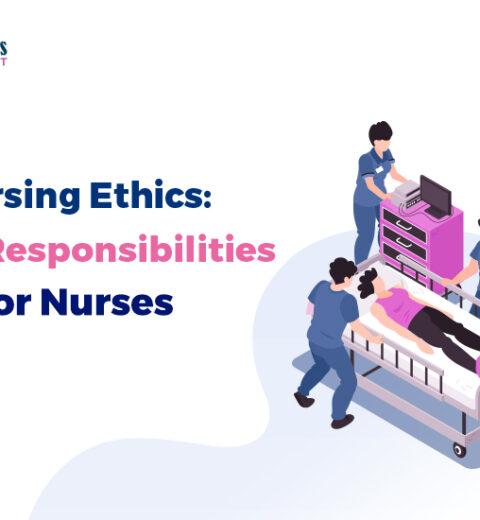All about becoming an advanced clinical practitioner in 2024
The advanced clinical practitioner is a Registered Nurse who has completed extended training and earned additional academic credentials in order to examine, assess, diagnose, treat, prescribe and refer patients.
An extension of the nursing position, becoming an NHS Advanced Nurse Practitioner is an excellent method to broaden your scope of practice within a specific area of nursing.
This blog post is dedicated to all aspiring nurses who are looking to advance their careers as Advanced Nurse Practitioners (ACP). It all everything about ACPs in it.
What is an advanced clinical practitioner?
Master-level healthcare professionals and advanced clinical practitioners, the ACPs hail from a variety of fields like paramedicine, nursing, occupational therapy, and pharmacy.
They have earned the skills and knowledge to take on extended roles and scopes of practice while caring for patients.
The importance of Advanced Clinical Practioner (ACP)?
There is increased importance associated with the role of advanced clinical practitioners in recent days. It is important for the below reasons:
- Offers career progression and job satisfaction
- To provide more efficient care for patients
- To provide superior patient and organisational care
- It provides the ability to retain and develop employees in accordance with local needs
- It increases the capacity, capability, productivity, and efficiency of multi-professional teams to better meet local health requirements
- Provides a platform for ongoing team training and education
- Identifies potential clinical challenges and recommends solutions
What are the roles of Advanced Clinical Practitioners?
Advanced clinical practitioners eventually work as middle-level physicians. They assist existing and clinical care to improve multi-professional teams’ capacity and capability. Their roles include:
- incorporating leadership, managerial, and/or instructional skills
- exercising a significant degree of autonomy and clinical decision-making
- improving clinical continuity
- provide better patient-centered treatment
- ensuring patients receive safe, accessible, and high-quality care
- assess, diagnose, plan, administer, and evaluate treatment/interventions and care
- Diagnose and treat acute and chronic illnesses, using both medication and non-drug treatment options in a treatment plan.
- Prescribe and review medications for therapeutic effectiveness, in compliance with evidence-based practice
- Work with patients to encourage adherence to and compliance with prescribed medications
- The role comprises leadership and management, education, and research within the Practice, in addition to clinical practice
Steps to become an Advanced Clinical Practitioner?
Advanced clinical practice is more of a level of practice than a specific style of practice. With the mastery attained through their clinical knowledge and skills, ANPs exercise the latitude and authority to behave as any medical colleague would, and go ahead to assess, diagnose, and even treat patients independently.
In order to become one, it takes a little effort, both education- and work-wise. Here is a detailed split up of both requirements that must be met to work at this advanced level.
Educational requirements
- A UK 2:2 Hons degree or comparable quality in other relevant credentials accepted by an accredited higher education university
- An existing current registration from the Nursing and Midwifery Council registration
- Current employment in a clinical or clinically linked field. This should include the support of a clinical mentor who is able to assess your competency practice and support
- Post-registration clinical experience of at least two years
- At least one positive recommendation, specifically from your current employer including confirmation of the required practice experience and mentor support
Work-related clinical requirements
In order to work as an advanced nurse practitioner at a higher level, you must complete certain requirements. The following requirements must be satisfied in order to work at this advanced level:
- The NMC’s active registration
- Revalidation requirements
- Master’s degree — for example, MSc Advanced Clinical Practice
- Should have practiced the so-called four pillars of practice including clinical practice, leadership and administration, education, and research
- Have a job plan that reflects this and is on par with others in this position
- Be an NMC-registered independent prescriber
- Demonstrate proof and evidence to:
- act independently and autonomously
- evaluate and manage risk efficiently
- being consciously competent
- being responsible for decisions and actions
- being able to holistically address all medical needs
- have the ability to give thorough medical care, keeping in mind the complete need.
Benefits of Advanced Clinical Practitioner
ACPs prove to be beneficial in so many ways. Since they have the requisite knowledge, skills, training, and qualifications, the ACPs can bridge gaps within the Multidisciplinary Team (MDT), bringing professionals together. Besides the rise in the salary and increased duties, the following advantages are available to all employees:
- Patient-centered treatment, enhanced patient journeys, and better-informed patients
- Improvements in the continuity of patient care and service quality
- Improved communication between patients and the multidisciplinary team boosts job satisfaction, aids recruitment, and retention, and closes the skills gap.
- teamwork with more flexibility
Tips to become an advanced clinical practitioner
Now that you know everything about an Advanced Nurse Practitioner? Here are some suggestions and actions you can take:
- Find a field of nursing in which you want to be an ANP and practice as a nurse in that area to make sure it’s the correct fit for your emphasis before you start your Advanced Nurse Practitioner training.
- If you work for a Trust, keep an eye out for any openings because they can help you figure out what you need to accomplish.
- Working and studying can be balanced if done correctly. If you wish to start your MSc Advanced Practice while working, take one module at a time.
- Look into your funding options, since it may be feasible to acquire funding from your company. Choose modules directly relevant to the type of Nurse Practitioner you want to be and the location you’ll be practicing in.
- Attempt to obtain experience in a variety of settings: Recognizing and managing a wide range of illnesses across specialties, as well as managing a variety of patients, will provide you with the kind of knowledge that can only be learned through experience.
- Keep in mind that ANPs are usually senior, experienced nurses, frequently at Band 7 or 8, so make sure you’re at the correct stage and amount of experience in your nursing career before moving up.
Final Thoughts
ACPs are crucial in providing a range of therapeutic areas in healthcare. Theirs is always a competitive role as they provide numerous diagnoses and treatments. We hope this blog post of ours answered all questions about becoming an advanced nurse practitioner. If you want to become an Advanced Clinical Practitioner, contact us at JP Medicals Recruitment. We have challenging positions that will help you provide safe, clinical decision-making and professional care of high quality.
FAQ
What are the 4 pillars of ACP?
The 4 pillars of practice advocate the crucial principles behind Nursing. Being the one of the most trusted professionals with a long and distinguished heritage, Nurses have an important role to play in meeting the diverse needs of the public. A registered nurse or an ACP working should therefore possess significant strengths within each of the four pillars of:
- Advanced clinical practice
- Leadership
- Facilitation of education and learning
- Evidence research and development
The four pillars of ACP is nothing but a framework for advanced clinical practice, which stresses that the professionals should possess in order to evidence additional core capabilities.





